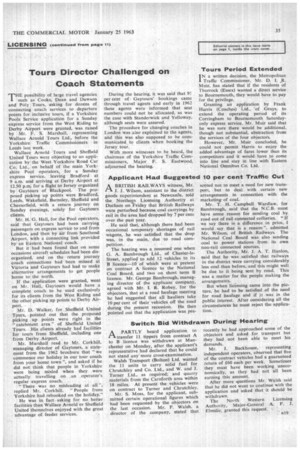Applicant Had Suggested 10 per cent Traffic Cut A BRITISH RAILWAYS
Page 37

If you've noticed an error in this article please click here to report it so we can fix it.
witness, Mr. J. J. Wilson, assistant to the district goods superintendent at Newcastle, told the Northern Licensing Authority at Durham on Friday that British Railways were perturbed because coal carryings by rail in the area had dropped by 7 per cent over the past year.
He said that, although there had been occasional temporary shortages of rail wagons he was satisfied that the drop was, in the main, due to road competition.
The hearing was a resumed one when G. A. Bambrough Ltd., of Chester-leStreet, applied to add 12 vehicles to its B licence—I0 of which were at present on contract A licence to the National Coal Board, and two on short term B licence. Mr. George Bambrough, managing director of the applicant company, agreed with Mr. I. R. Robey, for the objectors, that at a road haulage meeting he had suggested that all hauliers take 10 per cent of their vehicles off the road during the present recession. He then pointed out that the application Was pre sen not to meet a need for new trans port, but to deal with certain new arrangements in connection with the marketing of coal.
Mr. T. H. Campbell Wardlaw, for Bambrough, said that the N.C.B. must have some reason for sending coal by road out of rail connected collieries. "If we say there is a difference in price, would say that is a reason ", admitted Mr. Wilson, of British Railways. The National Coal Board was also sending coal to power stations from its own non-rail connected sources.
The Authority, Mr. J. A. T. Hanlon, said that he was satisfied that railways in the district were carrying considerably less coal than before, and this might well be due to it being sent by road. This was a matter for the people making the arrangements.
But when licensing came into the picture, he had to be satisfied of the need for road haulage and if it was in the public interest. After considering all the circumstances he must reject the application.
















































































































